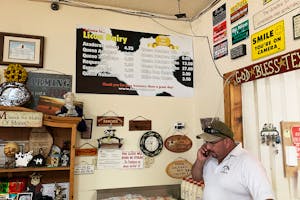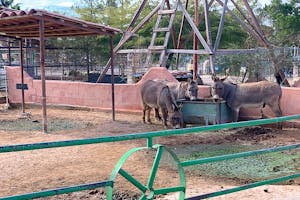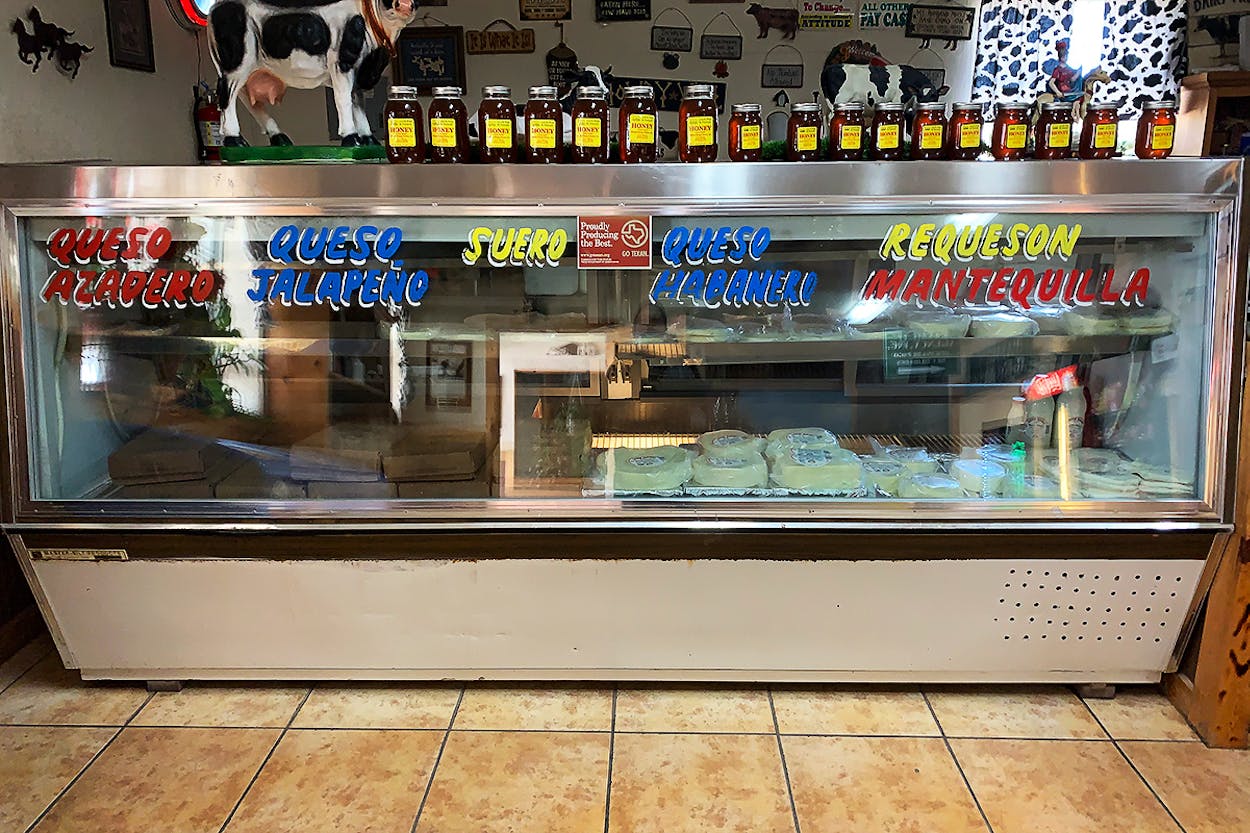Drive southwest out of El Paso on Socorro Road, and the cityscape rapidly becomes countryside. The speed limit drops; farms and ranches take the place of strip malls and chain restaurants. Occasionally, the U.S.–Mexico border fence comes into view, and brown signs marking the old El Camino Real de Tierra Adentro—which used the natural, long-traversed mountain pass that gives El Paso its name—stand gleaming along the road’s shoulder. It’s along this stretch of the camino, locally known as the Old Mission Trail, that the Licon family has been making milky, wonderfully stretchy queso asadero for sixty years.
Here, in the small town of San Elizario, a fabricated barnlike storefront houses the family’s cheese-making operation, store, and restaurant. The business began here in the sixties, in the home kitchen of Eugenio Licon Sr. and his wife, Maria, when the pair came into a small herd of Holstein milk cows. Applying the culinary skills and recipes Maria learned from her parents—Californians who moved to El Paso in the fifties and sold homemade cheese out of their kitchen—the young couple started selling cheese from their ranch. Eugenio Sr., a native of Juárez, supplemented sales by taking the product directly to potential customers.
“My dad started going door to door selling cheese,” says 52-year-old Eugenio “Boy” Licon Jr., who took over the business from his father in 2004. Slowly but steadily, the family built a loyal customer base. By the early seventies, Licon Dairy had gone from a direct-to-consumer operation to a brick-and-mortar shop. Today, the business spreads across fifty acres, and the dairy now sells about 400 ten-slice packages daily of their staple cheese.

On my visit, I asked for a tour of the production kitchen. A corner of the busy space was visible from the cash register counter, where I was speaking with Licon. My request was denied with a smile and a curt but soft no. He didn’t want to give away any family secrets. “You can ask me whatever you want, though, and let me get you a sample,” Licon said. Then he ran off to fetch two twists of fresh, cooling queso asadero. In my right palm, the creamy white cheese relaxed a little, releasing juices. Its edges reflected the light from the bulbs overhead. I lifted my open palm to my mouth and let the cheese drop onto my tongue. Warmth lingered. I wish that experience had lasted longer.
What exactly is queso asadero? Boy Licon describes it as a Hispanic string cheese. He means that the cheese, a specialty of northern Mexico and the borderlands, is similar to the easily pulled, good-for-melting queso Oaxaca and mozzarella. He shared his process. “After the pasteurization, we go through a mixture between the sour milk and fresh milk. That’s the acidity, which makes the texture of the cheese.” Once the whey is removed from the curds, the curds are put into the oven to roast until they melt and form a pliable mass. “That’s where it gets the name ‘asadero,’” he explains. (The word means “grilled” or “roasted.”) Next, the cheese is formed into the shape of tortillas. The “tortillas” are thin and stacked in groups of ten before being sealed in plastic.
“They’re great for quesadillas!” Licon exclaims. Indeed, it’s the first thing my wife and I made when I returned home with a bag of Licon queso asadero. The discs are equally good consumed in rolls in front of an open fridge.
Customers can also choose from eight-ounce or one-pound blocks of cheese spiced with habanero chiles or jalapeño, containers of crema Mexicana (a thinner, punchier sour cream), bottles of whey, and other dairy products. Licon cheese can be purchased only at the source. “We don’t do any distributing,” Licon says. “We have people from all over the country that come out here and purchase the cheese.” To his knowledge, no other small dairy in the United States uses the same traditional Mexican techniques.
One thing has changed. The Licon herd is gone. The family now sources their milk from Sarah Farms’ El Paso plant. The reason? The USDA purchased El Paso County dairy herds, including Licon, in 2003 in the wake of bovine tuberculosis cases in the region’s cattle. For a decade after that, Licon did run a small herd out of adjacent Hudspeth County. But after years of daily 120-mile round trips hauling milk, Boy Licon sold his remaining heads of cattle.

But that hasn’t halted Licon Dairy’s success. About 25 years ago, the Licon family opened a petting zoo on their property, starting with a pair of six-month-old ostriches purchased by Licon’s mother. The menagerie has grown to include llamas, peacocks, sheep, goats, donkeys, and even a camel, among other critters. Licon says the animals continue to draw crowds, and he doesn’t charge admission. “We have field trips from schools that come out here during the week. We have people from the whole El Paso area that come and visit us. It’s a fun part for the kids who have never experienced anything like a petting zoo,” he says. Some visitors buy cheese after their tour, which allows Licon to keep the zoo free. (The zoo, which has been closed since early May as a result of the COVID-19 pandemic, reopens July 3.)
The enclosures lead to the back of the farm, to the old house where Licon’s parents made their first batch of cheese. At the top of an arch on the building’s facade is a wooden sign with a feeding cow and the words “Licon Azaderos.” Among the other sights and structures in the petting zoo are a rickety playground and a grotto honoring the Virgen de Guadalupe.
Last summer, Licon’s son, Angel, opened the Outlaw Saloon & Grill behind the retail shop as a way to keep people on the farm when they get hungry. Until the restaurant was closed because of COVID-19 restrictions, Licon cheese went on the burgers and, of course, quesadillas. Licon says the family is hoping to reopen the restaurant with new safety protocols on the same day as the petting zoo, July 3. The family also hosts RVs for overnight stays. Other guests visit the missions on the El Camino Real and include the dairy as a stop along their self-guided tours.
That’s it for growth, as far as Licon is concerned. “I was born on this farm,” Boy Licon says. “I love working with animals and doing the same business as my parents. … The smaller the business, the easier it is for us to maintain it and to keep using the same techniques my grandparents and parents used. It’s a good life.”
Licon Dairy
11951 Glorietta Road, San Elizario
Phone: 915-851-2705
Hours: 6 a.m. to 5 p.m. daily








